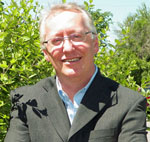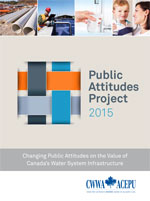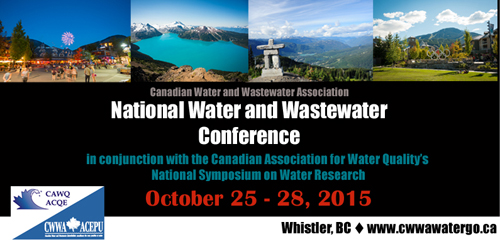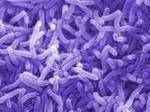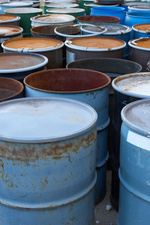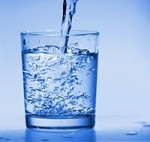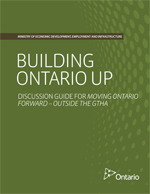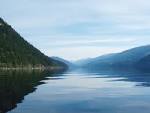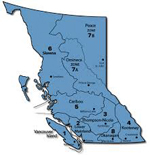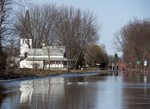| June 25, 2015
|
In This Issue |
|
CWWA News
|
|
|
Federal Initiatives
|
|
|
National News
|
|
|
Provincial News
|
|
|
International News
|
|
|
CWWA Member Profiles
|
|
|
Snippings and Clippings
|
|
Just coming back from what I call The Springboard – the semi-annual meeting of your Board of Directors. This year, your volunteer directors from almost every province and territory, met in Halifax to review the year past and set a course for the year ahead – actually for the next few years and beyond.
|
The CWWA Climate Change Committee has curated a collection of credible and helpful resources pertaining to the water sector to help water professionals access important climate change assessment and adaptation planning knowledge. The Climate Change Committee is pleased to offer resources for managing climate change impacts to your operations and facilities.
|
The Canadian Water and Wastewater Association (CWWA), is proud to release a new report titled Public Attitudes 2015. This report, prepared in cooperation with Water Canada and the Actual Media team, is offered as a guidebook for communities developing communications plans around their water and wastewater services. We hope that such public communications campaigns will help bridge the gap between public opinion and the reality of our water infrastructure challenges.
|
CWWA is excited to share the preliminary Conference program! Visit the Conference webpage to browse our lineup of speakers and topics.
Environment Canada and the US Environmental Protection Agency (EPA), in partnership with Health Canada, recently posted a statement outlining how future regulatory cooperation under the Canada-United States Regulatory Cooperation Council (RCC) Initiative on Chemicals Management will be undertaken. In addition, the organizations announced that they have developed work plans describing medium-term collaboration activities in two areas: approaches for regulatory reporting requirements for new uses of chemical substances (Significant New Activity provisions in Canada and Significant New Use Rules in the US); and approaches for chemical risk assessment. This collaboration will also advance initiatives under the Chemicals Management Plan.
|
Environment Canada and Health Canada have jointly published the outcomes of two screenings under the Canadian Environmental Protection Act for two living organisms specified on the Domestic Substances List (DSL). Screening under the DSL is to ensure that substances or organisms do not pose an environmental or human health threat.
|
The Chemicals Management Plan Progress Report has been created to keep stakeholders and other interested parties up to date on the activities and programs related to Canada's Chemicals Management Plan (CMP). The report is produced jointly by Environment Canada and Health Canada and is published twice a year. It reports on advances in major initiatives and highlights key activities related to the Government of Canada's recent work under the CMP. It also informs you about coming events, dates of interest and how to get involved.
|
The survey is a census of drinking water plants serving 300 or more people, and asks for information on volumes of water treated, type of treatment, financial aspects of the operation, as well as raw (source) water quality. The survey results produce a national portrait of treatment processes and costs, and source water quality across Canada. These data will be used to track the state of source water stocks on a regional basis and will also be used in the development of environmental accounts and indicators.
|
A recent article, published by CBC examined how many of the parameters listed in the Canadian Drinking Water Quality Guidelines major cities in the country test for. The story includes a tool allowing you to select your city and see how many (or how few) parameters your city tests for.
|
FCM launched a campaign calling for a national federal leaders debate on municipal issues during the upcoming election. Thomas Mulcair, Justin Trudeau, and Elizabeth May have all agreed to participate in a debate on municipal issues, leaving just one more leader left to confirm: Stephen Harper.
|
Ontario Ministry of the Environment and Climate Change (MOECC) is currently considering public comments on its latest approvals reform proposal: moving many permits to take water to the "permit by rule" approach of the Environmental Activity and Sector Registry (EASR).
|
The Government of Ontario announced, May 21, 2015, the launch of consultations on infrastructure priorities for new infrastructure programs to serve communities and regions outside the Greater Toronto and Hamilton Area (GTHA). Under its Moving Ontario Forward initiative, the government has allocated $15 billion for investment in roads, bridges, transit, and other critical infrastructure in regions outside the GTHA.
|
The Office of the Auditor General of British Columbia published two reports that emphasize the importance of managing the cumulative environment effects for sustainable natural resource development.
|
The BC Oil & Gas Commission (OGC) recently issued the 2015 version of its "Water Portal" - an online map-based application that provides water-related data collected by various government agencies, industry, and external groups.
|
The Government of New Brunswick announced in May 2015, that the province is creating a Provincial Roundtable on Emergency Management and Resiliency to better prepare for extreme weather events and other emergencies. Public Safety Minister and Solicitor General, Stephen Horsman, said numerous events in the last decade have illustrated risks, exposed vulnerabilities, and highlighted areas for improvement in the current approach to emergency management. The Roundtable is to be launched this month (June 2015) under the chairmanship of Public Safety deputy minister Craig Dalton.
|
October 13th to 15th, 2015, hundreds will convene in Tel Aviv for Israel’s biennial WATEC conference, an international gathering of business executives, water utility engineers, political decision makers and leading researchers in the field of water technology. One may ask, why travel all the way to Israel, a country composed of over 50 per cent desert, to learn about water? The answer lies in Israel’s history.
Clevest provides software for mobile workforce automation and smart grid operations exclusively for electric, gas and water utilities. Over 140 utilities worldwide have chosen Clevest to transform their field operations by harnessing the power of our software and deep domain knowledge of mobile computing and utility operations.
|
Water Canada Michigan Governor Rick Snyder and leaders from other Great Lakes states and Canada gathered in Quebec City for the Conference of Great Lakes and St. Lawrence Governors and Premiers on June 13.
|
Water Canada After two weeks under severe water restrictions, the City of Regina advised its citizens on June 8 that they can slowly return to normal water use. The decision was made after sufficient improvements to water quantity were shown at Buffalo Pound Lake and the Buffalo Pound Water Treatment Plant, which supplies drinking water to Regina, Moose Jaw, and the surrounding area.
|
Water Canada Not a day goes by that we don’t read or hear something about energy, be it political, controversial, or aspirational. Everyone is thinking about where our energy comes from today and how we’ll be meeting our energy needs in the future. There’s a lot of talk—and investment—in energy innovation.
|
Water Canada On May 29, Quebec's Environment Minister David Heurtel and Ontario's Environment Minister Glen Murray announced the creation of a joint Ontario-Quebec Committee on Water Management. The idea of deepening co-operation between the two provinces, in part by creating a joint committee, was first discussed at the most recent meeting of the Quebec and Ontario cabinets.
|
Water Canada Canada’s State of the Oceans Report acknowledged many of the concerns scientists and conservationists have raised for decades: increasing acidity, a significant thinning of sea ice in the Far North, depletion of life-supporting oxygen in waterways, and wholesale shifts in coastal wildlife populations. Issued in 2012, the Fisheries and Oceans Canada document pointed to causes ranging from natural cycles to industrial development and warned of trouble ahead as entire ecosystems continue to undergo unprecedented change.
|
Vancouver Sun When it comes to possible future water crises, B.C. is in a strong position — that is, if we begin talking about water management issues now.
|
Eagle Valley News The need for federal infrastructure funding was a high priority item at this year’s Federation of Canadian Municipalities in Edmonton from June 5 to 8.
|
National Post Drought-stricken California is not the only place draining underground aquifers in the hunt for fresh water. It’s happening across the world, according to two new studies by U.S. researchers.
|
cbc.ca Many Canadian cities are falling short of testing drinking water for all possible harmful contaminants, and experts say the long-term consequences could be detrimental to people's health, a CBC News investigation has found.
|
Huffington Post In many areas of Canada, like Ontario, the levels of potentially pathogenic microbes can flourish and overwhelm our water treatment system leading to boil water orders or worse, outbreaks. These moments are thankfully rare thanks in part to the addition of a particular chemical, chlorine.
|
Digital Journal Several pharmaceutical companies have been accused by a campaign organization of contributing to the rise of antibiotic resistance among types of pathogenic bacteria, the so-termed "super bugs."
|
CBC The City of Greater Sudbury is asking people to stop putting sloppy, greasy substances down the sink or in the toilet. Instead, the city is providing a container called a FOG bucket — for fats, oils and grease.
|
CTV News In a few weeks a generator in North Dakota will fire up, powered by nothing more than waste water from an oil well. The pilot project is designed to show that it's possible to generate geothermal electricity from the boiling water that comes out of the wells.
|
CTV News It may be lurking in your diet soda, your chewing gum and even in your favourite yogurt. Now scientists have found artificial sweeteners are also coming out of your faucet.
|
Globe & Mail Groundwater is Canada’s hidden natural resource. Rich with freshwater lakes, rivers, and streams, we take for granted that this same abundance lies beneath us. Yet, Canada’s true knowledge of the state of its groundwater remains spotty and deceptive.
|
SOWC's cutting-edge equipment is enabling a group of top water experts at the University of Waterloo to conduct innovative research aimed at improving how we clean our drinking water.
|
|
| |
|



